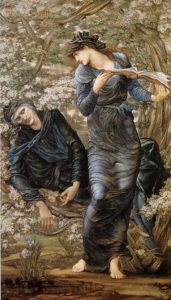A few years ago, I decided to try writing a fantasy book as a web serial. It was a project I came to for a lot of reasons, but one of the keys was that I wanted to have a way to put a little joy out into the world on a regular basis with my writing.
 That idea spawned a whole cozy fantasy trilogy, which is now complete! And I am Kickstarting funds to officially publish them as books.
That idea spawned a whole cozy fantasy trilogy, which is now complete! And I am Kickstarting funds to officially publish them as books.
That starting seed, that fundamental goal to bring joy with story, shaped the whole trilogy in ways I didn’t initially predict. After all, what does it even mean to write fiction that is “uplifting?” As with anything, people have different tastes for what brings them joy or makes them feel validated.
When it comes to uplifting fiction, I think of this along an axis of “escapism” to “realism.” To be clear, I don’t consider either of these a value judgment: tastes vary, and we all crave different kinds of stories at different times.
For some people, what they want is fantasy that takes them away from their problems. They want to read about other worlds that don’t have the same micro and macroaggressions””or even just the minutiae of daily life””that they have to deal with every day of their actual lives.
For others, those fantasies are unrelatable at best, or erasure at worst, pretending real-world problems don’t exist rather than giving us characters who grapple with them and triumph in some fashion, empowering us in our real worlds thereby.
Fantasy authors have the power to invent the entirety of what goes into our worlds, what’s explicit and implicit. Do we choose to carry over the sexism, racism, queerphobia, ableism, and all the rest from our world and tell a story where characters find happiness despite their oppression? Or do we imagine a world where those oppressions don’t exist, and in so doing invite the reader to imagine other ways of being worth striving for?
Both approaches can be radical. Both can be triumphant, validating, and uplifting stories””though not necessarily for the same audience, and that’s fine.
In Tea Princess Chronicles, I tried to find a balance between them. I wanted to write about people who care about other people, and lifting up everyone around them, and gutting oppressive systems who prevent that; people who do the work, without the feeling it can be too easy to drown in while doomscrolling on social media that caring is a necessarily joyless slog. I wanted to tell stories about people who find ways to make things better, in small ways and large, that don’t feel like wallowing in awfulness but instead inviting joy.
More like the feeling of drinking a warm cup of tea in front of the fireplace on a chilly day.
Whether I succeeded, whether any story succeeds, is a judgment for each individual reader. But I think living with joy, and spreading joy, can be fundamentally radical, and storytelling is one of the most powerful mediums for it. For me, that’s what “uplifting” fiction does, in whatever form it takes.
 BIO: Casey Blair writes adventurous fantasy novels, including the cozy fantasy series Tea Princess Chronicles and the novella Consider the Dust. After graduating from Vassar College, her own adventures have included teaching English in rural Japan, attending the Viable Paradise residential science fiction and fantasy writing workshop, and working as an indie bookseller. She now lives in the Pacific Northwest and can be found dancing spontaneously, exploring forests around the world, or trapped under a cat. Find out more at caseyblair.com or follow her on Twitter @CaseyLBlair.
BIO: Casey Blair writes adventurous fantasy novels, including the cozy fantasy series Tea Princess Chronicles and the novella Consider the Dust. After graduating from Vassar College, her own adventures have included teaching English in rural Japan, attending the Viable Paradise residential science fiction and fantasy writing workshop, and working as an indie bookseller. She now lives in the Pacific Northwest and can be found dancing spontaneously, exploring forests around the world, or trapped under a cat. Find out more at caseyblair.com or follow her on Twitter @CaseyLBlair.
If you’re an author or other fantasy and science fiction creative, and want to do a guest blog post, please check out the guest blog post guidelines. Or if you’re looking for community from other F&SF writers, sign up for the Rambo Academy for Wayward Writers Critclub!









